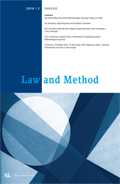|
Dit artikel gaat over de vraag in hoeverre en hoe ervaringsonderwijs in de master-fase van de rechtenopleiding kan bijdragen aan de ontwikkeling van de professionele identiteit van juristen. Het presenteert de uitkomsten van een onderzoek naar het ervaringsonderwijs aan de Faculteit der Rechtsgeleerdheid (FdR) van de Universiteit van Amsterdam (UvA), waarbij gebruik is gemaakt van een mixed-methodsbenadering. De uitkomsten van de kwalitatieve studie laten zien dat ervaringsonderwijs kan bijdragen aan het vertrouwen dat een student heeft in het eigen vermogen om adequaat te kunnen optreden als jurist, de motivatie van een student en diens zelfbeeld. Tevens volgt uit deze studie dat een belangrijk aspect in het al dan niet bevorderen van de professionele identiteit de rol van de docent is. De kwantitatieve studie, gebaseerd op data die onder andere tijdens de coronapandemie zijn vergaard, laat geen significante uitkomsten zien. Desalniettemin bieden beide studies aanknopingspunten voor verder onderzoek naar ervaringsonderwijs in de rechtenopleidingen en een bredere discussie over hoe we rechtenstudenten het beste kunnen voorbereiden op hun rol in de toekomstige rechtspraktijk in het licht van maatschappelijke en technologische ontwikkelingen. |

| Artikel |
|
| Keywords | professionele identiteit, rechtenopleiding, jurist van de toekomst., evaringsondewijs |
| Authors | Rosa Möhrlein, Chevy van Dorresteijn, Iris van Domselaar e.a. |
| AbstractAuthor's information |
| Artikel |
|
| Keywords | Philosophy of Law, Critical Race Theory, Legal Idealism, Law and Methodology |
| Authors | Adebayo Oluwayomi |
| AbstractAuthor's information |
|
This article examines archetypal philosophy of law curricula in selected colleges and universities in the United States, revealing a problem regarding how the curriculum is set up to portray the view that philosophical discussions about the law ought to be fundamentally abstract with no bearing on material existence. This teaching practice and pedagogical setup proceed from a certain ideological commitment that seeks to portray legal philosophy in idealistic frames of normativity, justice, universality, and shared human aspirations devoid of the entanglement of the law with the social reality of the prevalence of racism in the American society. This article aims to explore two tenets of Critical Race Theory (CRT) as methodology (the interest convergence principle and racial realism), to accentuate how the philosophy of law curriculum can be revamped to embrace other ‘voices’ and perspectives and, thereby, present a comprehensive view regarding the philosophical thinking about the law. |
| Artikel |
|
| Keywords | misdemeanor court, right to counsel, methodology, qualitative research |
| Authors | Alisa Smith, Natalie Mousa and Sarah K. Stice |
| AbstractAuthor's information |
|
This article focuses on the methodological lessons learned while conducting a legal research study of the lower criminal courts by gathering observational and interview data to understand why many defendants charged with misdemeanor or summary offenses proceed without counsel. The present study describes the socio-legal methodology employed and draws from project memorandums and research assistants’ field notes gathered during court observations and written reflections following defendant interviews. The present article addresses the methodological obstacles and lessons learned from gathering complex data on rights waivers and focuses on how we might improve the legal study of the lower criminal courts and answer critical constitutional and procedural questions by improving our legal methods. |
| Artikel |
|
| Keywords | Roman dictatorship, crisis government, emergency powers, legal historical research |
| Authors | Lukas van den Berge |
| AbstractAuthor's information |
|
Doctrinal approaches to Roman law are currently often supplemented by contextual legal-historical scholarship that aims to expose Roman law’s connections with its socio-political, religious and broader intellectual environment. This article draws attention to the relevance of such contextual research for modern legal problems. An analysis of the Roman dictatorship and its reception history in legal and constitutional scholarship serves as a case in point. Contrary to common belief, the far-reaching powers of the Roman dictator – acting to save the Roman Republic in times of great peril – were controlled by informal rather than formal legal restraints. A corrected understanding of the Roman dictatorship is arguably not only important for an appropriate assessment of the Roman constitution itself but also for current debates on the limits of legality in times of emergency. |
| Artikel |
|
| Keywords | Scoping review, systematisch literatuuronderzoek, rechtsgeleerdheid |
| Authors | Loran Kostense |
| AbstractAuthor's information |
|
In some scientific fields, such as the medical and social sciences, systematic literature reviews are frequently conducted. A systematic search for literature minimizes the risk of overlooking information or drawing conclusions based on an incomplete overview. This article focuses on a type of systematic literature reviews, the scoping review method, that may be of interest to legal scholars. This method can be used to answer an exploratory research question aimed at identifying important concepts or knowledge gaps by systematically searching, selecting and synthesizing literature. In seven steps, following the PRISMA guideline, the scoping review method is outlined. Concrete examples are outlined using a case example: a scoping review on divorce-related relocations in the context of doctoral research at the Vrije Universiteit Amsterdam. |


